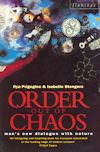Ilya Prigogine, winner of the Nobel Prize in 1977
for his work on the thermodynamics of nonequilibrium systems,
makes his ideas accessible to a wide audience
in this astonishing book which has engendered massive debate in Europe and America.
He and his colleague Isabelle Stengers show how
the two great themes of classical science, order and chaos,
which co-existed uneasily for centuries,
are being reconciled in a new and unexpected synthesis:
‘We know now that nonequilibrium, the flow of matter and energy,
may be a source of order. We have a feeling of
great intellectual excitement: we begin to have a glimpse
of the road that leads from being to becoming.’

